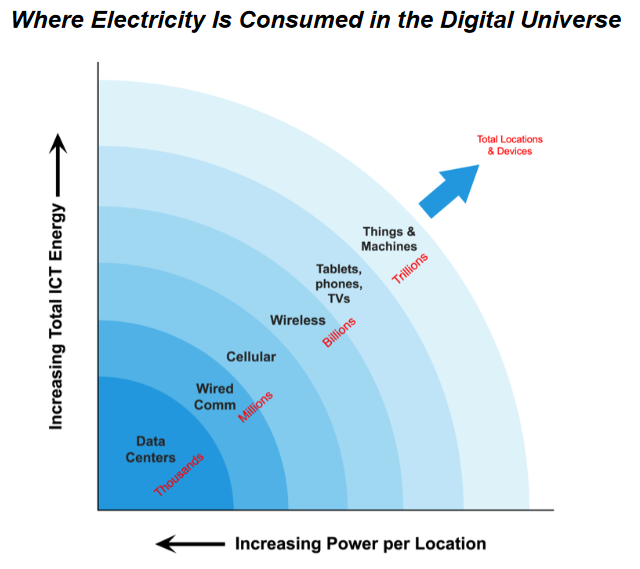The “Surprisingly” Large Energy Footprint of the Digital Economy
“Our computers and smartphones might seem “clean,” but the digital economy uses a tenth of the world’s electricity—and that share will only increase, with serious consequences for the economy and the environment.
The global Information-Communications-Technologies (ICT) system now uses approximately 1,500 terawatt-hours of power per year. That’s about 10% of the world’s total electricity generation or roughly the combined power production of Germany and Japan. It’s the same amount of electricity that was used to light the entire planet in 1985. We already use 50% more energy to move bytes than we do to move planes in global aviation.
Reduced to personal terms, although charging up a single tablet or smart phone requires a negligible amount of electricity, using either to watch an hour of video weekly consumes annually more electricity in the remote networks than two new refrigerators use in a year. And as the world continues to electrify, migrating towards one refrigerator per household, it also evolves towards several smartphones and equivalent per person.”
“Does reading an e-book, or watching a streaming video, use more energy than reading it on paper, or buying a DVD? Does playing a video game use more energy than playing Monopoly? Does a doctor using an iPad for diagnostic advice from artificial intelligence in the Cloud use more energy than, what? Traveling for a second opinion? The answer involves more than knowing how much electricity one iPad, PC or smartphone uses. It requires accounting for all the electricity used in the entire ICT ecosystem needed to make any of that possible, and the energy characteristics of the ICT ecosystem are quite unlike anything else built to date. Turning on a light does not require dozens of lights to turn on elsewhere. However, turn on an iPad to watch a video and iPad-like devices all over the country, even all over the world, simultaneously light up throughout a vast network. Nothing else in society operates that way. Starting a car doesn’t cause dozens of cars elsewhere to fire up.”

